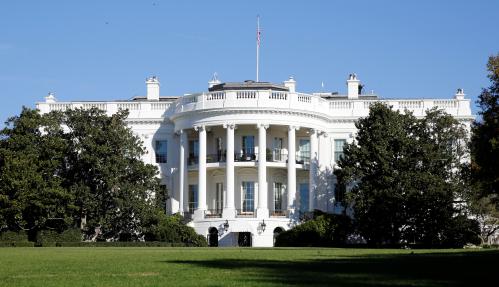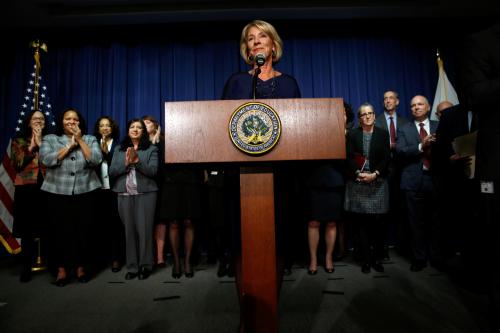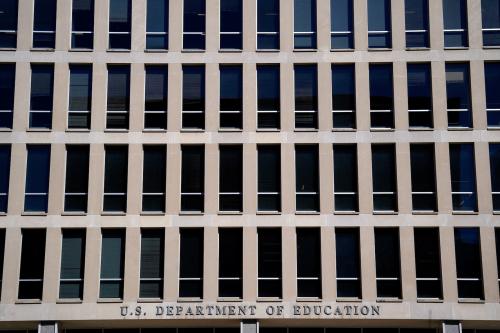Sen. Elizabeth Warren is one of several Democratic presidential candidates who is highlighting education as a key policy issue in their campaigns. A few weeks after announcing an ambitious proposal to forgive nearly half of all outstanding student debt and strip for-profit colleges’ access to federal financial aid (among other issues), she returned to the topic in advance of a town hall event with the American Federation of Teachers in Philadelphia. In a tweet earlier this week, Warren promised that her secretary of education would be a public school teacher.
But Betsy DeVos is just a symptom of a badly broken system. We’re up against powerful forces, and to win, we need big structural change. So here’s my plan: Under a Warren administration, the Secretary of Education will be a public school teacher. pic.twitter.com/4M33NGTNJt
— Elizabeth Warren (@ewarren) May 13, 2019
Selecting a former teacher as secretary of education would be far from unprecedented: Both Rod Paige (under George W. Bush) and John King (under Barack Obama) were public school teachers before holding administrative positions. But if Warren or any other Democrat wants to influence American education to the greatest extent possible, the candidate should appoint someone with a strong background in higher education instead of—or in addition to—K-12 education. (The same also applies to Donald Trump, who apparently will need a new secretary of education if he wins a second term.) Below, I discuss a few reasons why the Department of Education’s next leader should come from higher ed.
First, the Every Student Succeeds Act, signed into law in 2015, shifted a significant amount of power from the Education Department to the states. Putting a teacher or another K-12 expert in charge of the department may result in better K-12 policy, but the change is likely to be small due to the reduced amount of discretion. ESSA-required state accountability plans have already been approved by the department, taking away a key oversight role of the department. This means that the federal government’s power in K-12 education has shifted more toward the appropriations process, which is controlled by Congress. An example of this is the Trump administration’s proposed $5 billion in tax credits to support school choice programs, which is unlikely to gain support from House Democrats.
Meanwhile, on the higher education side of the ranch, I still see a comprehensive Higher Education Act reauthorization as being unlikely before 2021—even though Sen. Lamar Alexander is promising a bill soon. This means the Education Department will keep its authority to act on a broad range of policy issues while possibly allowing the next secretary to influence what future legislation looks like.
I could see a narrowly targeted bill on FAFSA simplification getting through Congress, but HEA reauthorization is going to be tough in three main areas. The first is for-profit college accountability, where Republicans want to treat all sectors the same and Democrats generally want tougher rules on the for-profit sector. The second is the setup of student loan repayment plans, as Democrats opposed Republican-backed efforts to end Public Service Loan Forgiveness and make repayment plans for graduate students less generous. Finally, the parties are at loggerheads on several items broadly tied to social issues, such as Title IX, campus safety, and free speech. Warren’s proposal from last month probably makes HEA reauthorization tougher, as it will pull many Senate Democrats farther to the left on the first two issues, and the disagreements on social issues are large enough to likely kill any major reauthorization.
Unless the Higher Education Act is reauthorized in a way that sharply limits the secretary of education’s authority (which is quite unlikely), the next secretary of education will continue to have power on a wide range of issues through the negotiated rulemaking process. Both the Obama and Trump administrations used negotiated rulemaking to shape policies without going through Congress, and a Democratic president is likely to rely on a new secretary to undo Trump-era policies and to propose new policies in areas such as Title IX and campus safety.
On the other hand, a higher ed veteran will also be useful to a second-term Trump administration, as the department will likely still be hard at work finalizing rules on issues such as borrower defense to repayment, Title IX changes, and this year’s series of negotiated rulemaking sessions on accreditation and innovation. In order for regulations to take effect before the 2020 elections, final regulations must be issued by November 1 of this year. With an understaffed Education Department, at least some of these regulations will spill over into 2021. A new Republican secretary of education could then turn his or her attention to issues of free speech on campus—an issue that has gotten the attention of President Trump.
Both Democrats and Republicans have strong political reasons to appoint someone with a background in K-12 education to lead the Department of Education. Teachers’ unions are a key political ally for Democrats and are much stronger in K-12 education than in higher education, and Secretary Betsy DeVos is wildly unpopular among teachers. Republicans have also historically leaned heavily on the K-12 side to attract support, with school choice and local control traditionally being key issues for their voters.
Yet given the Education Department’s greater ability to shape higher education relative to K-12 education over the foreseeable future, any president who wants to make a mark in education policy will choose a higher education veteran as the next secretary of education.
The Brookings Institution is committed to quality, independence, and impact.
We are supported by a diverse array of funders. In line with our values and policies, each Brookings publication represents the sole views of its author(s).








Commentary
Our next secretary of education should be drafted out of college, not high school
May 17, 2019